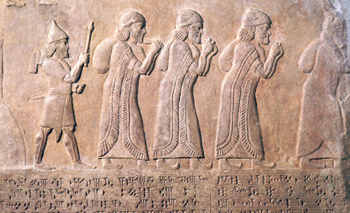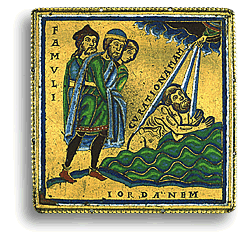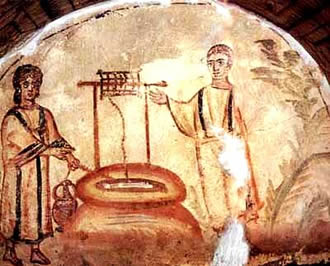For Sunday October 9, 2016
Lectionary Readings (Revised Common Lectionary, Year C)
Jeremiah 29:1, 4–7 or 2 Kings 5:1–3, 7–15c
Psalm 66:1–12 or Psalm 111
2 Timothy 2:8–15
Luke 17:11–19
For those of us who've become overly familiar with the Bible, it can sometimes read like a tired text. But last week I read a book by A.N. Wilson called The Book of the People (2016) that reminded me how the Bible is often full of subversive surprises.
Three of the lectionary readings this week are stories that reverse the roles of smug insiders and excluded outsiders. They show how God speaks and acts in shocking ways and places, far beyond my pathetic little boundaries.
Jeremiah 29 recalls the destruction of Jerusalem in 586 BCE. The army of the king of Babylon besieged Jerusalem, breached the city walls, then "burned down every important building." They plundered and pillaged, executed government officials, deported the elite, and left the poor to fend for themselves amidst famine and disease.
The puppet king Zedekiah consulted with Jeremiah: "Is there any word from the Lord?"
Yes, said Jeremiah, there was a word from God. Surrender to Babylon. Give up. Don't fool yourself. Don't listen to the "reckless lies" and "false dreams" of your sycophants. This is the end of the end. Accept defeat.
Later, Jeremiah wrote a letter to the prisoners of war who had been exiled to Babylon:
 |
|
Exile to Babylon.
|
"This is what the Lord Almighty, the God of Israel, says to all those I carried into exile from Jerusalem to Babylon: 'Build houses and settle down; plant gardens and eat what they produce. Marry and have sons and daughters; find wives for your sons and give your daughters in marriage, so that they too may have sons and daughters. Increase in number there; do not decrease. Also, seek the peace and prosperity of the city to which I have carried you into exile. Pray to the Lord for it, because if it prospers, you too will prosper.'"
Seek the welfare of your pagan conqueror, who just burned your sacred temple to the ground. May the blessing of God be on Babylon. Embrace your exile, for there will be no miraculous exodus this time.
Ancient Babylon is now modern day Iraq. The historical ruins of Babylon, including the remains of Nebuchadnezzar's palace, are in the town of Hillah, about 60 miles south of Baghdad. Saddam Hussein exploited its historical fame by calling himself "the son of Neduchadnezzar."
And so a modern paraphrase of Jeremiah's letter. Accept your defeat by Iraq. Pray for its prosperity. Seek God's blessing for Saddam and Baghdad.
It's no wonder that Jeremiah's own people tried to murder him for this treasonous message.
2 Kings 5 tells the story of Naaman. He was a military officer of a major enemy of Israel — Aram. The narrator praises Naaman in glowing terms: "He was a valiant soldier, a great man in the sight of his master and highly regarded." Then he ads a shocking detail: "through Naaman the Lord had given victory to Aram."
God gave victory to Israel's enemy through a pagan officer? Yes.
Again, a creative re-reading for today. Ancient Aram in central Syria is modern day Halab — Aleppo. It's one of the oldest continually inhabited cities in the world.
 |
|
Naaman the Syrian washes in the Jordan River, 12th century Germany.
|
"Bashar al-Assad was a Syrian military general, praised by all as a valiant warrior and a great man. The Christian God had granted victory to Muslim Syria through Assad." This is not where the story of Naaman ends, the story ends with his conversion to "the one true God," but it's definitely where it begins. It makes for very uncomfortable reading.
Luke is the only Gentile author in the Bible. Whereas the very first sentence of Matthew calls Jesus "the son of David, son of Abraham," Luke describes him as "the son of Adam" — that is, Jesus is not just the king of the Jews, he's the son of all humanity.
For Jesus, the election of the Jews did not mean the exclusion of the Gentiles. Throughout the gospels, the Jewish Jesus embraced the unclean Gentiles — the Roman centurion, the Canaanite woman and her demon-possessed daughter, the woman at the well in John 4, the good Samaritan, and then this week's gospel in Luke 17 about the healing of the ten lepers.
As we know, only the outsider Samaritan gave thanks to Jesus for his healing — and even Jesus didn't refrain from calling him "this foreigner."
Once again, there's a theology of geography at play in this story. The ruins of ancient Samaria are now found near Nablus (ancient Shechem), in the West Bank. In this contemporary retelling, as with the other two stories, we have another unlikely hero — the only person to turn back and give thanks to God is a West Bank Palestinian.
In his book The Faith of the Outsider; Exclusion and Inclusion in the Biblical Story, Frank Spina explores this insider-outsider theme. He reminds us that it's impossible to ignore the "scandal of particularity" throughout Scripture.
In the Old Testament, Israel alone is God's elect people: "You only have I known of all the families of the earth." And Israel is not only God's special insider community; "it is the only insider community." All other nations are distinctly outsiders — in Paul's language, "excluded from the commonwealth of Israel, and strangers to the covenants of promise."
 |
|
Jesus and the Samaritan woman at the well, Roman catacomb.
|
But that's only part of the story, for there are many plot reversals, like the three stories for this week. The Bible often elevates the outsider. This inclusion of outsiders, Spina argues, is "neither incidental nor haphazard in the biblical witness."
These outsider stories cast the insider in a negative light and the outsider as superior in virtue or faith. Spina considers seven of these stories where the outsider is brought in and the insider is cast out — Esau, Tamar (incest), Rahab (a whore), Jonah, Ruth (a resident alien), the woman at the well in John 4 who had married five times, and then Naaman.
Psalm 66 for this week is addressed not just to Israel, but to "all the earth." It's a reminder to look beyond the limitations of our own little worlds, and to consider the strange ways and places that the creator of all the world is at work.
Image credits: (1) PatrickTReardon.com; (2) The British Museum; and (3) Christian Iconography, Augusta State University.





